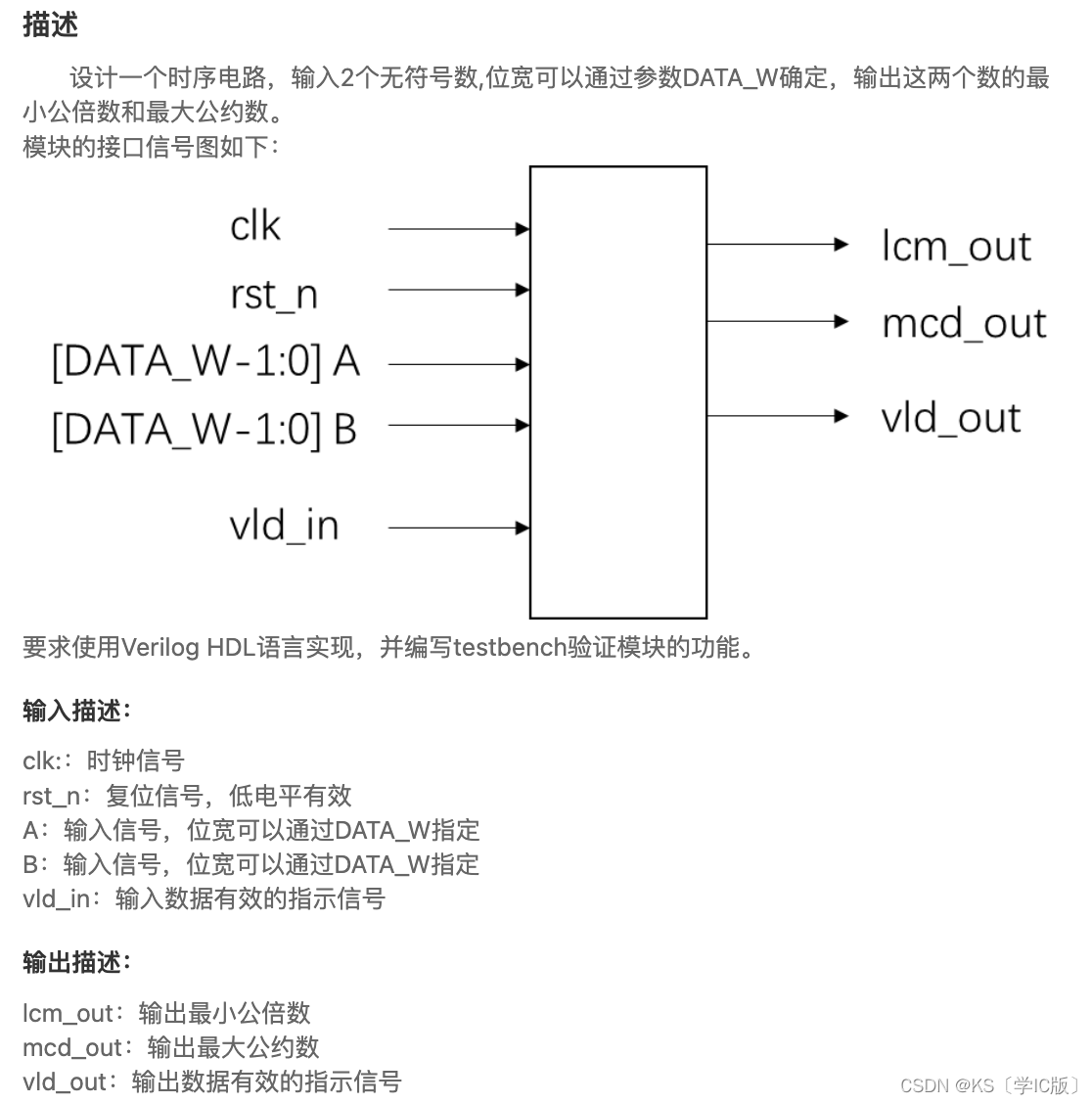「Verilog学习笔记」求最小公倍数
发布时间:2024年01月04日
专栏前言
本专栏的内容主要是记录本人学习Verilog过程中的一些知识点,刷题网站用的是牛客网

题目要求求解两个数的最小公倍数,而最小公倍数可以通过两个数的乘积除以两个数的最小公约数得到。乘法是容易计算的,所以问题变成如何求解最大公约数。可以采用辗转相减法求解,
例如 :两个自然数35和14,用大数减去小数,(35,14)->(21,14)->(7,14),此时,7小于14,要做一次交换,把14作为被减数,即(14,7)->(7,7),再做一次相减,结果为0,这样也就求出了最大公约数7。
???????然后可以实现除法器IP核或者之间使用 ‘/’进行除法运算得到最小公倍数,‘/’在多数的编译器中也可以进行综合。
`timescale 1ns/1ns
module lcm#(
parameter DATA_W = 8)
(
input [DATA_W-1:0] A,
input [DATA_W-1:0] B,
input vld_in,
input rst_n,
input clk,
output wire [DATA_W*2-1:0] lcm_out,
output wire [DATA_W-1:0] mcd_out,
output reg vld_out
);
reg [DATA_W*2-1:0] mcd, a_buf, b_buf, mul_buf ;
reg mcd_vld ;
reg [1:0] state, nstate ;
parameter idle = 0, S0 = 1, S1 = 2, S2 = 3 ;
always @ (posedge clk or negedge rst_n)
if (!rst_n) state <= idle ;
else state <= nstate ;
always @ (posedge clk or negedge rst_n)
if (!rst_n) begin
nstate <= idle ;
mcd <= 0 ;
mcd_vld <= 0 ;
a_buf <= 0 ;
b_buf <= 0 ;
mul_buf <= 0 ;
vld_out <= 0 ;
end
else begin
case (state)
idle :
if (vld_in) begin
a_buf <= A ;
b_buf <= B ;
nstate <= S0 ;
mul_buf <= A * B ;
mcd_vld <= 0 ;
vld_out <= 0 ;
end
else begin
nstate <= idle ;
mcd_vld <= 0 ;
vld_out <= 0 ;
end
S0 :
if (a_buf != b_buf) begin
if (a_buf > b_buf) begin
a_buf <= a_buf - b_buf ;
b_buf <= b_buf ;
end
else begin
b_buf <= b_buf - a_buf ;
a_buf <= a_buf ;
vld_out <= 0 ;
end
nstate <= S0 ;
end
else begin
nstate <= S1 ;
vld_out <= 0 ;
end
S1 : begin
mcd <= b_buf ;
mcd_vld <= 1 ;
nstate <= idle ;
vld_out <= 1 ;
end
default : begin
nstate <= idle ;
vld_out <= 0 ;
end
endcase
end
assign mcd_out = mcd ;
assign lcm_out = mul_buf / mcd ;
endmodule
文章来源:https://blog.csdn.net/m0_54689021/article/details/135380562
本文来自互联网用户投稿,该文观点仅代表作者本人,不代表本站立场。本站仅提供信息存储空间服务,不拥有所有权,不承担相关法律责任。 如若内容造成侵权/违法违规/事实不符,请联系我的编程经验分享网邮箱:chenni525@qq.com进行投诉反馈,一经查实,立即删除!
本文来自互联网用户投稿,该文观点仅代表作者本人,不代表本站立场。本站仅提供信息存储空间服务,不拥有所有权,不承担相关法律责任。 如若内容造成侵权/违法违规/事实不符,请联系我的编程经验分享网邮箱:chenni525@qq.com进行投诉反馈,一经查实,立即删除!
最新文章
- Python教程
- 深入理解 MySQL 中的 HAVING 关键字和聚合函数
- Qt之QChar编码(1)
- MyBatis入门基础篇
- 用Python脚本实现FFmpeg批量转换
- MySQL面试题 | 06.精选MySQL面试题
- AcrelCloud-3000环保用电监管云平台解决方案——安科瑞赵嘉敏
- 【闯关练习】—— 1400分(构造)
- 重设红帽Linux root密码:简单实用指南
- Linux|shell编程|实验总结|期末考查试题
- Go语言中的乐观锁与悲观锁
- 亚马逊,速卖通,美客多卖家怎么才能安全及有效的积累产品的评论
- HJ-FR3协作机器人为什么备受高校和科研机构青睐?
- Qt-setIcon无法加载图片为图标
- 【Linux】安装n卡驱动以及可能遇到的问题